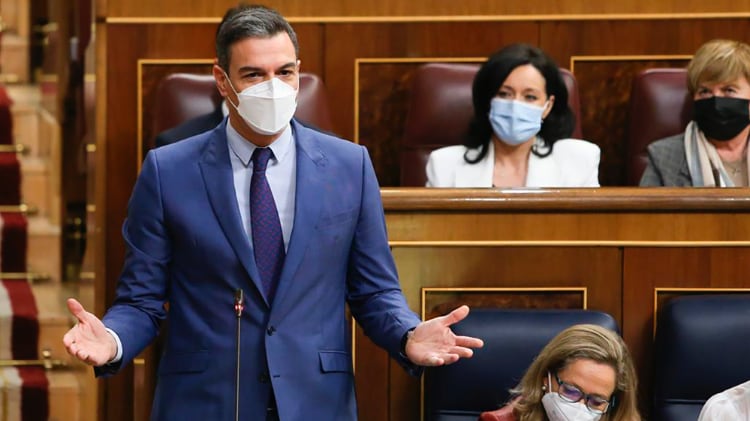Ángel Collado
The war in Ukraine and the change in the presidency of the PP have upended the political situation in Spain with an unusual distribution of roles that leaves evidence of the parliamentary weakness of the Executive.
It is the new head of the opposition, Alberto Núñez Feijóo, who plays the role of government with a complete and detailed plan against the economic crisis, while Pedro Sánchez’s communist partners and pro-independence allies play the role of opposition, both in foreign policy (over the Sahara and military aid to Zelenski) and domestically, in the case of the Catalan separatists to demand new cessions of powers and funds.
This week, the coalition cabinet will once again put its stability to the test in Congress. Sánchez submits a decree of urgent measures to alleviate the effects of the crisis to the House for validation, which does not convince even the groups that usually get the government out of trouble, whether it is short or misguided.
The inflation figure of 9.8 percent, known on 29 March when the decree was presented, left the few measures adopted out of date. The PP considers it a mere stopgap and, in order to support it from the opposition, demands that its economic alternative be taken into account, the 40 pages that Feijóo has sent to the Palacio de La Moncloa with his recipes for lowering taxes and reducing the political and bureaucratic apparatus of the Executive. It would mean a turnaround in economic policy that would be difficult for the social-communist cabinet to digest.
Sánchez’s allies have found the pretext to reissue the usual marketing of their votes in Congress: the case of the alleged spying on the leaders of the Catalan secessionist parties. They declare themselves scandalised by the possibility that the state security apparatus, specifically the National Intelligence Centre (CNI), has used the Pegasus programme to follow the activities of the main leaders of the parties involved in the attempted coup of 1 October 2017.
The Basque nationalists of the PNV and the heirs of ETA’s political wing, now grouped in Bildu, have joined their pro-independence colleagues in demanding explanations from Sánchez at the same time as talks on the decree are taking place. Without their support next Thursday the decree would lapse.
The Catalan separatists are raising the price so as not to upset Sánchez and, from the outset, they hope to reactivate talks “between governments” to make progress on their secession project. They want an immediate meeting and their first objective is to get their hands on the distribution of the so-called Minimum Vital Income payments that are now controlled by the central government.
The government is accustomed to its partners’ threats to break with it, just as the independentistas know that they can always get something more in exchange for sustaining the coalition government in power, from penitentiary benefits for terrorist prisoners to cessions of powers or privileges in investments.
In the case of relations with Podemos, Sánchez has given free rein to permanent and consensual internal criticism. The Executive sends arms to Ukraine, although always behind the main European countries, while the communist sector of the Cabinet itself claims to be opposed and defends in the conflict the positions ‘for peace’ that are more equidistant from Europe and contrary to NATO’s role. The Podemos members have no intention of leaving the ministries, nor can the chief executive dismiss them because they are his fundamental support for remaining in power.
With this spectacle of dissidence within the bloc of parties that supports Sánchez, the party founded by Pablo Iglesias is cultivating its populist left-wing base. And at the same time the independentistas are doing their own thing on their own turf, not daring to let the government that brought their main leaders out of prison, convicted of sedition and embezzlement of public funds, fall.
The novelty now is that the social-communist government’s peculiar system of alliances and support paralyses any effective or substantive response to the worsening economic crisis.
The new opposition headed by Feijóo is presenting its own recipes and alternatives to the government’s blockade, aware that they will not be taken into account, but at the same time convinced that it is the best investment to gain credit in the eyes of the public. Faced with the ideological fight, the PP opts for the field of economic management to differentiate itself from the inaction it denounces in Sánchez’s cabinet. And at the same time, it highlights Vox’s inexperience and populism in the same area.







